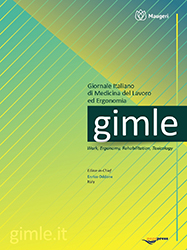[Informed consent in Occupational Therapy: proposal for a model form]
All claims expressed in this article are solely those of the authors and do not necessarily represent those of their affiliated organizations, or those of the publisher, the editors and the reviewers. Any product that may be evaluated in this article or claim that may be made by its manufacturer is not guaranteed or endorsed by the publisher.
Authors
The legislative developments that led to the Three-year Degree of the Health Professions poses any health professional in the position of having to comply with the ethical and legal duty to obtain valid informed consent from the patient prior to treatment. In the present work, attention was focused on the figure of the occupational therapist.
Materials and methods. Informed consent forms have been developed according to the specific disease from which the patient undergoing occupational therapy is affected. The following categories of sick were identified: amputation, developmental age, orthopedy, spinal cord injury, neurology, psychiatry, geriatry and oncology.
Results and conclusion. The consent forms are particularly well suited to obtaining valid consent from the patient and, at the same time, allow the occupational therapist to obtain all the information he/she needs to carry out the treatment in safety. This results improved patient compliance to therapy by facilitating a better empathic relationship with the therapist.
How to Cite

This work is licensed under a Creative Commons Attribution-NonCommercial 4.0 International License.
PAGEPress has chosen to apply the Creative Commons Attribution NonCommercial 4.0 International License (CC BY-NC 4.0) to all manuscripts to be published.






